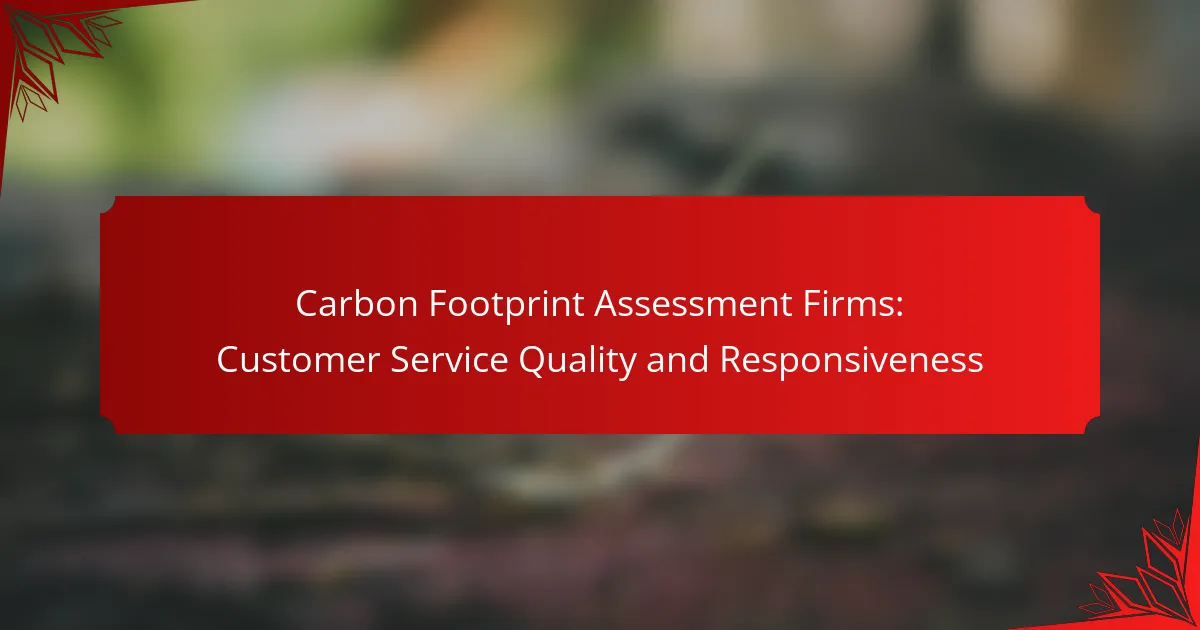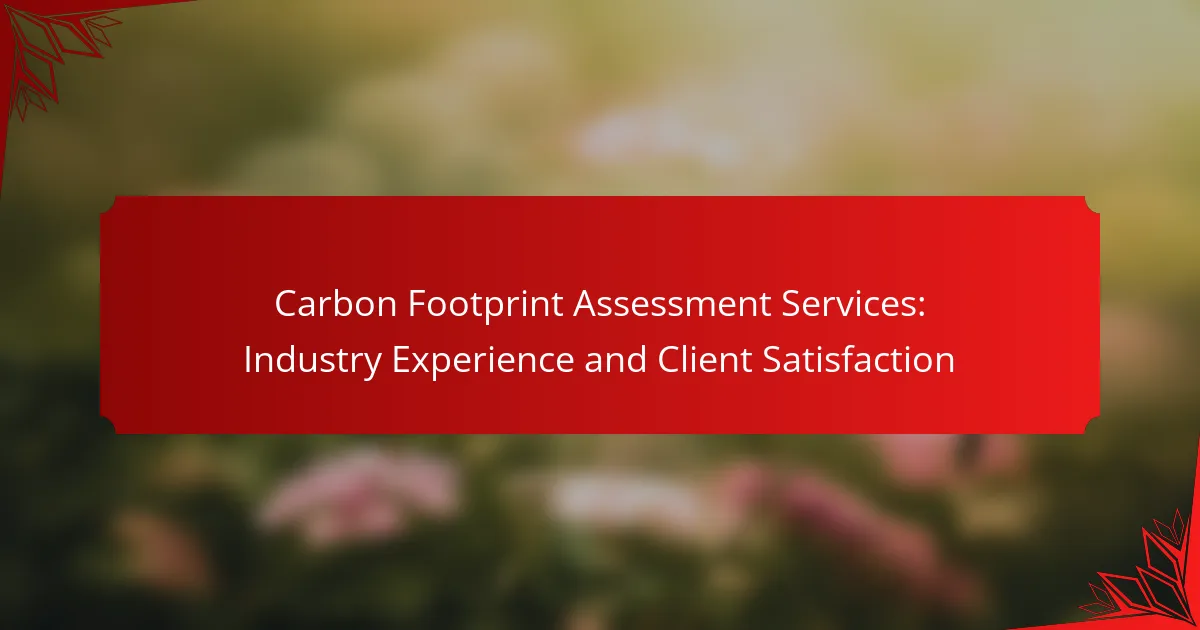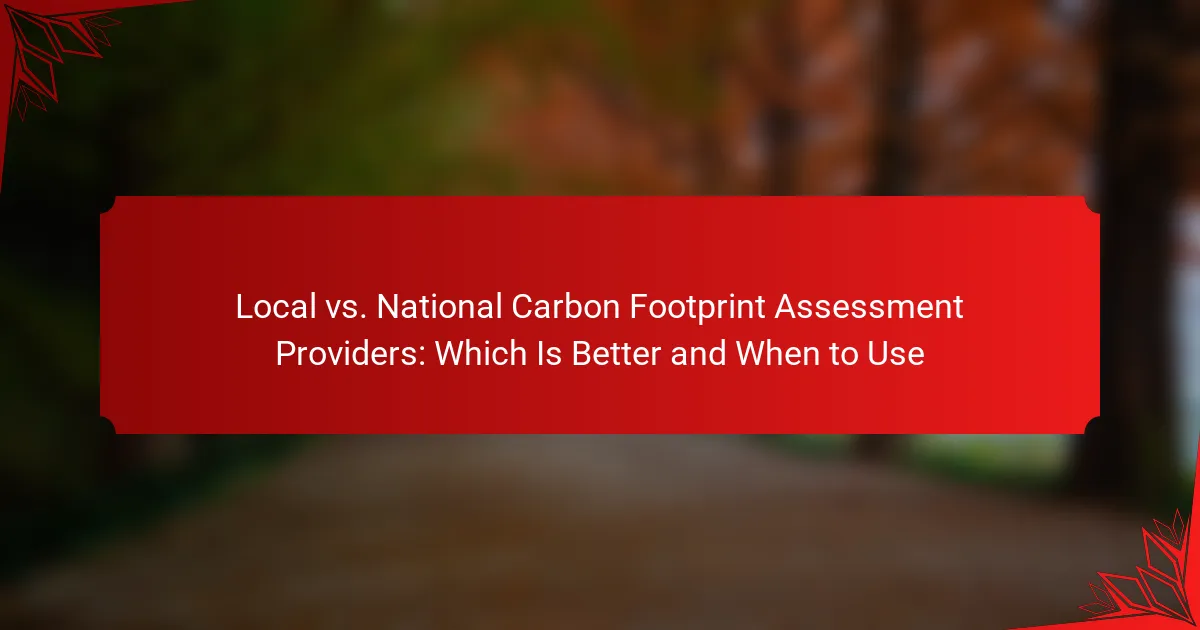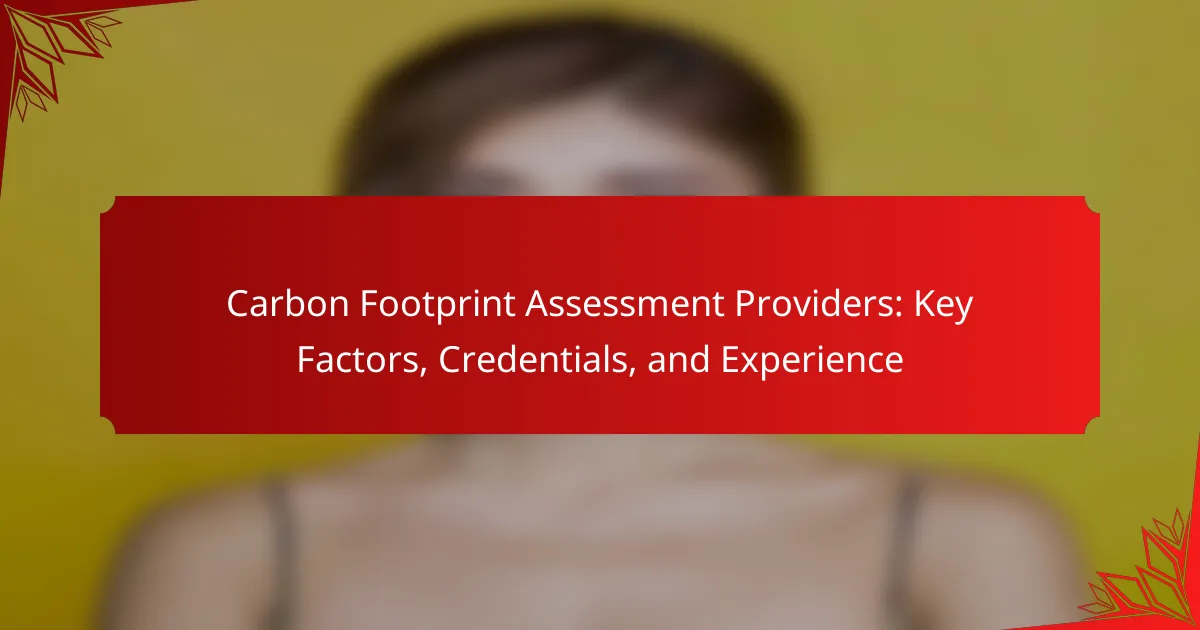Carbon footprint assessment firms play a crucial role in helping businesses measure and reduce their carbon emissions through tailored solutions. Their success is largely attributed to high-quality customer service and responsiveness, which are enhanced by systematic training and effective feedback systems. By focusing on staffing, technology integration, and response time metrics, these firms strive to meet the evolving needs of their clients efficiently.
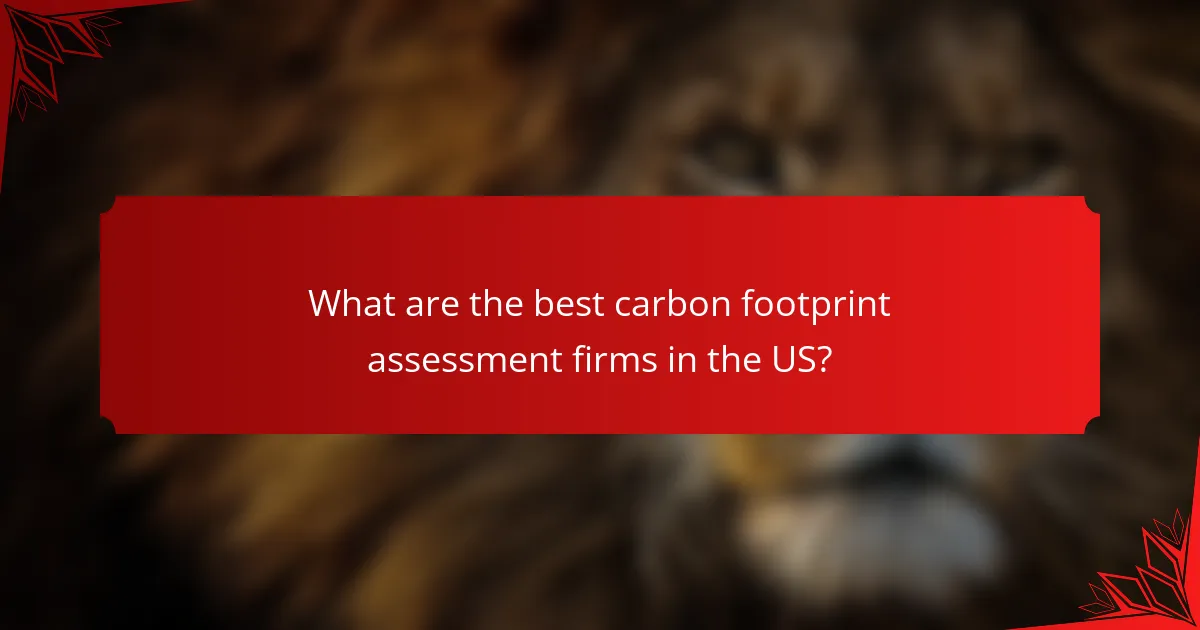
What are the best carbon footprint assessment firms in the US?
The best carbon footprint assessment firms in the US are known for their comprehensive methodologies, strong customer service, and responsiveness to client needs. These firms provide tailored solutions to help businesses measure and reduce their carbon emissions effectively.
EcoAct
EcoAct is a prominent player in the carbon footprint assessment space, offering a range of services including carbon accounting, sustainability strategy development, and reporting. They utilize internationally recognized standards to ensure accurate assessments, making them a reliable choice for businesses looking to understand their environmental impact.
Clients appreciate EcoAct’s commitment to customer service, with dedicated account managers who guide them through the assessment process. This personalized approach helps organizations implement effective carbon reduction strategies.
Carbon Trust
The Carbon Trust specializes in helping organizations reduce their carbon emissions and improve energy efficiency. They provide detailed carbon footprint assessments that comply with global standards, ensuring credibility in reporting.
With a focus on practical solutions, the Carbon Trust offers actionable insights and tools for businesses to track their progress. Their responsive customer service is tailored to meet the unique needs of each client, fostering long-term partnerships.
Greenhouse Gas Protocol
The Greenhouse Gas Protocol is a widely recognized framework for measuring and managing greenhouse gas emissions. It offers comprehensive guidelines that organizations can follow to assess their carbon footprints accurately.
While not a traditional assessment firm, the Protocol provides essential resources and tools that many firms utilize in their assessments. Organizations using this framework benefit from its global acceptance and the clarity it brings to emissions reporting.
Verra
Verra is known for its rigorous standards in carbon accounting and certification, particularly through its Verified Carbon Standard (VCS). This firm helps businesses assess their carbon footprints while also providing pathways for carbon offsetting through certified projects.
Verra’s customer service is focused on ensuring clients understand the certification process and its benefits. Their expertise in both assessment and offsetting makes them a valuable partner for organizations aiming to enhance their sustainability efforts.
Climate Neutral Now
Climate Neutral Now is an initiative that encourages individuals and organizations to measure, reduce, and offset their carbon footprints. It provides a straightforward framework for assessing emissions and offers resources for achieving climate neutrality.
The initiative emphasizes user-friendly tools and responsive support, making it accessible for businesses of all sizes. By participating, organizations can showcase their commitment to sustainability while receiving guidance on effective carbon management strategies.
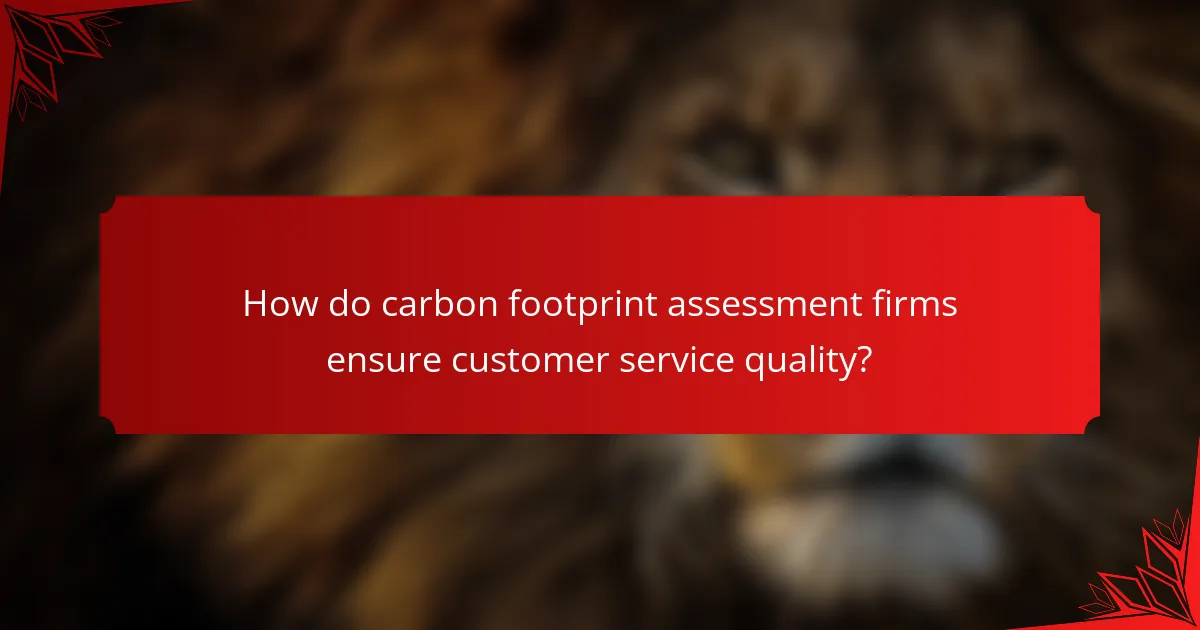
How do carbon footprint assessment firms ensure customer service quality?
Carbon footprint assessment firms ensure customer service quality through systematic training, robust feedback systems, and dedicated support teams. These strategies help maintain high standards and responsiveness to client needs.
Regular training programs
Regular training programs are essential for keeping staff updated on the latest methodologies and customer service practices. These programs often include workshops on communication skills, technical knowledge about carbon assessments, and updates on regulatory changes.
Firms may implement quarterly training sessions to reinforce skills and introduce new tools. This ensures that employees can effectively address client inquiries and provide accurate information regarding carbon footprint assessments.
Customer feedback mechanisms
Customer feedback mechanisms are vital for understanding client satisfaction and areas for improvement. Many firms utilize surveys and follow-up calls after service delivery to gather insights on the customer experience.
Implementing a structured feedback loop allows firms to quickly identify and rectify issues. For instance, if multiple clients express concerns about response times, the firm can address this by streamlining their processes or increasing staffing during peak periods.
Dedicated support teams
Dedicated support teams play a crucial role in ensuring timely and effective customer service. These teams are typically composed of specialists who focus solely on client inquiries related to carbon footprint assessments.
Having a dedicated team allows for quicker resolution of issues and more personalized service. Clients can expect to receive responses within a few hours, which enhances overall satisfaction and trust in the firm’s capabilities.
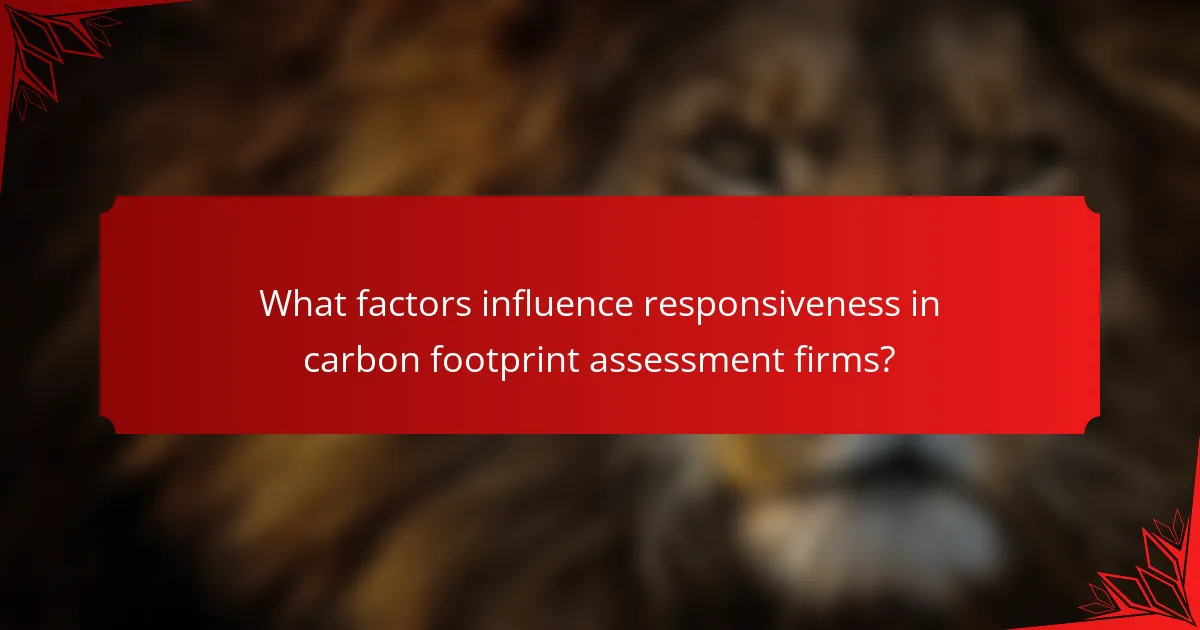
What factors influence responsiveness in carbon footprint assessment firms?
Responsiveness in carbon footprint assessment firms is influenced by various factors, including staffing levels, technology integration, and response time metrics. Understanding these elements can help firms improve their customer service quality and ensure timely communication with clients.
Staffing levels
Staffing levels directly impact a firm’s ability to respond promptly to client inquiries and requests. A well-staffed team can handle a higher volume of assessments and provide quicker feedback, while understaffing may lead to delays and reduced service quality.
Firms should aim for a balanced staffing model that accommodates peak periods without excessive idle time. Regularly reviewing workload and adjusting staffing accordingly can enhance responsiveness.
Technology integration
Integrating advanced technology into operations can significantly improve responsiveness in carbon footprint assessment firms. Tools such as customer relationship management (CRM) systems and automated reporting software streamline communication and data processing.
Firms should invest in technology that allows for real-time updates and client interactions. For example, using chatbots for initial inquiries can free up staff to focus on more complex tasks, enhancing overall efficiency.
Response time metrics
Measuring response time metrics is crucial for assessing a firm’s responsiveness. Key metrics include initial response time, resolution time, and follow-up time, which together provide insights into service efficiency.
Firms should establish benchmarks for these metrics, aiming for initial responses within a few hours and resolutions within a few days. Regularly reviewing these metrics can help identify areas for improvement and ensure that customer service standards are met consistently.
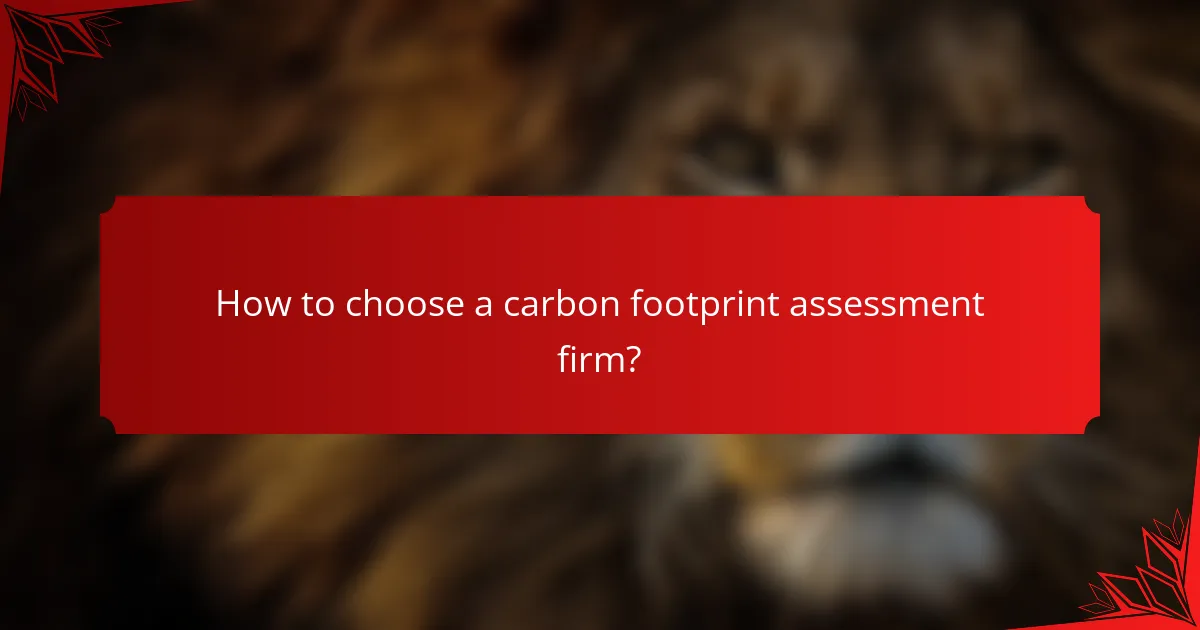
How to choose a carbon footprint assessment firm?
Choosing a carbon footprint assessment firm involves evaluating their service offerings, checking client testimonials, and assessing their pricing structures. A firm that aligns with your specific sustainability goals and demonstrates strong customer service is essential for effective collaboration.
Evaluate service offerings
When evaluating service offerings, consider the range of assessments provided, such as product lifecycle analysis, organizational carbon accounting, and emissions reduction strategies. Look for firms that offer tailored solutions to meet your unique needs, as generic assessments may not yield the best results.
Additionally, inquire about the methodologies used by the firm. Reputable firms often adhere to established standards like ISO 14064 or the Greenhouse Gas Protocol, ensuring their assessments are credible and reliable.
Check client testimonials
Client testimonials can provide valuable insights into a firm’s reliability and effectiveness. Look for reviews that highlight the firm’s responsiveness, communication quality, and overall customer satisfaction. Positive feedback from previous clients can indicate a firm’s ability to deliver on promises.
Consider reaching out to past clients directly for a more in-depth understanding of their experiences. This can help you gauge how well the firm collaborates and addresses client concerns throughout the assessment process.
Assess pricing structures
Pricing structures can vary significantly among carbon footprint assessment firms, so it’s crucial to understand what you are paying for. Some firms may charge a flat fee, while others might offer tiered pricing based on the complexity of the assessment or the size of your organization.
Request detailed quotes from multiple firms to compare costs effectively. Be cautious of extremely low prices, as they may reflect a lack of thoroughness or expertise. Aim for a balance between cost and quality to ensure you receive a comprehensive assessment that meets your needs.
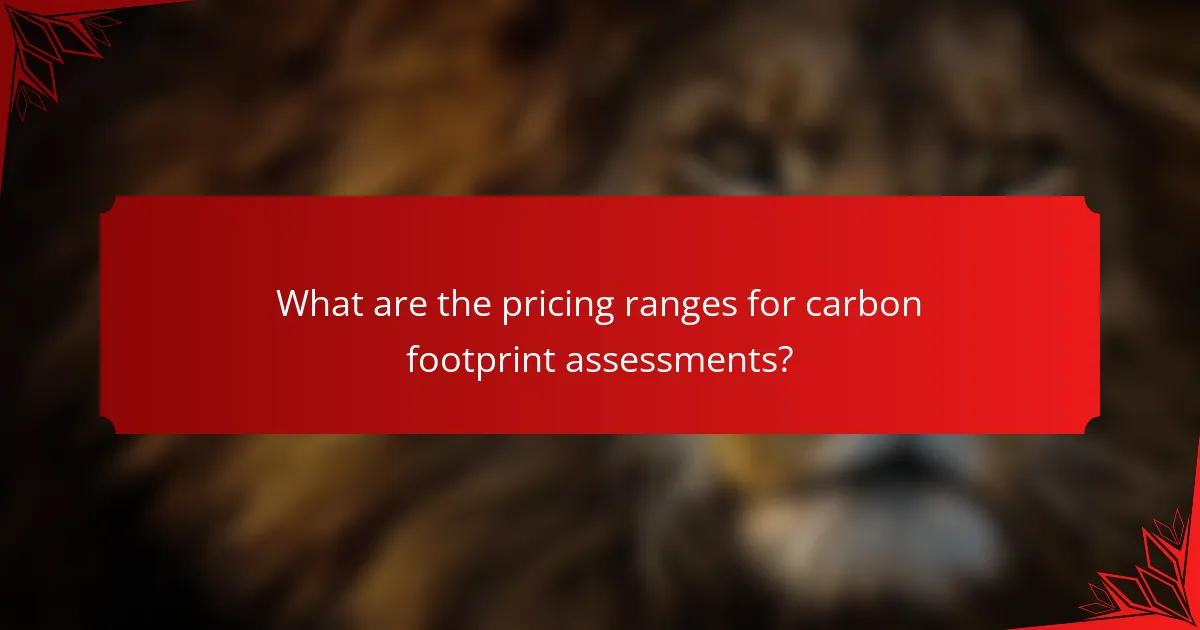
What are the pricing ranges for carbon footprint assessments?
Pricing for carbon footprint assessments can vary significantly based on the size and complexity of the organization. Generally, small businesses may spend a few hundred to a couple of thousand dollars, while larger enterprises could face costs ranging from several thousand to tens of thousands of dollars.
Small businesses
For small businesses, carbon footprint assessments typically range from approximately $500 to $2,500. Factors influencing the price include the scope of the assessment, the specific services offered, and the firm’s expertise. Many small firms opt for basic assessments that cover essential emissions sources.
When selecting a firm, consider their experience with similar businesses and ask for references. Avoid firms that offer one-size-fits-all solutions, as tailored assessments are often more effective.
Mid-sized companies
Mid-sized companies usually encounter costs between $2,500 and $10,000 for comprehensive carbon footprint assessments. These assessments often require more detailed data collection and analysis, reflecting the increased complexity of operations compared to smaller businesses.
It’s advisable for mid-sized firms to seek firms that provide a clear breakdown of their services and methodologies. This transparency helps ensure that the assessment aligns with the company’s sustainability goals and regulatory requirements.
Large enterprises
Large enterprises can expect to pay anywhere from $10,000 to $100,000 or more for carbon footprint assessments. The high costs are attributed to the extensive data gathering, sophisticated modeling, and in-depth reporting required for large-scale operations.
For these organizations, choosing a firm with a strong track record in corporate sustainability and compliance with international standards is crucial. Additionally, large enterprises should consider ongoing support for implementing recommendations and tracking progress over time.

What are the common customer service challenges faced by these firms?
Carbon footprint assessment firms often encounter several customer service challenges that can impact client satisfaction and retention. Key issues include high client expectations, communication gaps, and the complexity of service offerings.
High client expectations
Clients seeking carbon footprint assessments typically have high expectations regarding service quality and responsiveness. They often anticipate quick turnaround times, detailed reporting, and personalized support throughout the assessment process.
To meet these expectations, firms should establish clear communication channels and set realistic timelines for deliverables. Regular updates can help manage client expectations and foster trust.
Additionally, providing training for customer service representatives on the intricacies of carbon assessments can enhance their ability to address client inquiries effectively. This proactive approach can mitigate misunderstandings and improve overall client satisfaction.
